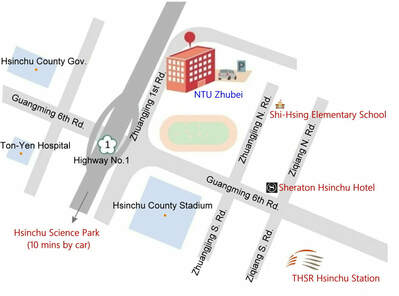High-Tech Industry is the industry applying advanced science technology to the fields of microelectronics, optoelectronics, precision instruments, electronic communications, nanotechnology, pharmaceutical preparation, microbiological research, medical equipment, animal experiments, aerospace technology, and other related industries.
To sum up, the science and technology required in the high-tech industry is high-tech. Herein, semiconductor is the grains of high tech industry. It not only possesses versatile substance that has both electrical conductivity and insulating properties, but also contains the transistor ability of digitization. Thus, semiconductor lays down the foundation of all the high-tech.
Semiconductor continuously brings forth improved technology, knowledge, economy, and quality of human life. It is well known, to fabricate semiconductor and to advance semiconductor technology, facility is a part of and prerequisite to semiconductor Manufacturing & R&D.
In a semiconductor manufacturing plant (fabrication fab) high performance tools, extremely precise instruments, and ultrapure utilities such as air, water, electricity and chemicals are needed for semiconductor manufacturing & R&D, Moreover, these tools/instruments/utilities must be operated in stringently controlled cleanrooms, on stable platforms, and/or performed under an ambience with electromagnetic compatibility.
To continuously ensure the economic development advantages of high-tech semiconductor industries at Taiwan, and to upgrade civil engineering, the High-Tech Facility Research Center was established by Department of Civil Engineering, National Taiwan University in fall 2006. The mission of the Center is to enhance high-tech facility R&D, to foster talents and to provide industrial service.
At the beginning, the Center focused on contamination control, electromagnetic mitigation, vibration elimination, construction and acceptance tests, and 3D facility information modeling and 4D (3D + Time) scheduling integration.
Current target issues include energy savings, carbon dioxide reduction, circulate economy of fab wastes, eco-environmental protection, smart manufacturing, big data, cloud computing, artificial intelligence(AI) for improving productivity, assuring the quality, safety, security and health of the facility, and enhancing the effective performance of environmental, social and governance (ESG) .
To sum up, the science and technology required in the high-tech industry is high-tech. Herein, semiconductor is the grains of high tech industry. It not only possesses versatile substance that has both electrical conductivity and insulating properties, but also contains the transistor ability of digitization. Thus, semiconductor lays down the foundation of all the high-tech.
Semiconductor continuously brings forth improved technology, knowledge, economy, and quality of human life. It is well known, to fabricate semiconductor and to advance semiconductor technology, facility is a part of and prerequisite to semiconductor Manufacturing & R&D.
In a semiconductor manufacturing plant (fabrication fab) high performance tools, extremely precise instruments, and ultrapure utilities such as air, water, electricity and chemicals are needed for semiconductor manufacturing & R&D, Moreover, these tools/instruments/utilities must be operated in stringently controlled cleanrooms, on stable platforms, and/or performed under an ambience with electromagnetic compatibility.
To continuously ensure the economic development advantages of high-tech semiconductor industries at Taiwan, and to upgrade civil engineering, the High-Tech Facility Research Center was established by Department of Civil Engineering, National Taiwan University in fall 2006. The mission of the Center is to enhance high-tech facility R&D, to foster talents and to provide industrial service.
At the beginning, the Center focused on contamination control, electromagnetic mitigation, vibration elimination, construction and acceptance tests, and 3D facility information modeling and 4D (3D + Time) scheduling integration.
Current target issues include energy savings, carbon dioxide reduction, circulate economy of fab wastes, eco-environmental protection, smart manufacturing, big data, cloud computing, artificial intelligence(AI) for improving productivity, assuring the quality, safety, security and health of the facility, and enhancing the effective performance of environmental, social and governance (ESG) .
關於我們
高科技產業是將先進科學技術應用到微電子、光電子、精密儀器、電子通訊、納米技術、藥物製劑、微生物研究、醫療器械、動物實驗、航天技術等行業的產業。
高科技產業所需要的科學技術就是高科技。 在這裡,半導體是高科技產業的基本米穀糧食,它不僅是兼具導電性和絕緣性的多功能物質,而且還具有電體晶數位化的能量,據此,半導體奠定了所有高科技的基礎。
半導體不斷給人類帶來改進的技術、知識、經濟和生活品質。 同時,眾所週知,要製造半導體和提升半導體技術,必先有廠房設施,廠房設施是半導體製造和研發不可分割的一部分和先決條件。
在半導體製造工廠中,半導體製造和研發需要高性能生產的機具、極其精密的儀器和超淨公共設施 : 譬如空氣、水、電和化學品,而且,這些機具/儀器/公共設施必須在嚴格控制的潔淨室、穩定的平台上和/ 或在具有電磁兼容性的環境下進行。
因此,為持續確保台灣高科技半導體產業的經濟發展優勢,提升土木工程,台灣大學土木工程於2006年秋季成立【高科技廠房設施研究中心】,中心的使命係加強高科技廠房設施研發,培養人才,並提供產業服務。
該中心成立初期,專注於污染控制、電磁波之降低、振動之消除、施工和驗收測試、 3D 設施資訊建模以及 4D(3D + 時間)之整合連結。
目前的研發課題包括節能減碳、工廠廢棄物循環經濟、生態環保、智慧製造、大數據、雲端計算、運用人工智慧(AI)提高生產力,確保品質、安全、保全和員工身心健康,並促進環境、社會和治理 (ESG)的成效。
高科技產業所需要的科學技術就是高科技。 在這裡,半導體是高科技產業的基本米穀糧食,它不僅是兼具導電性和絕緣性的多功能物質,而且還具有電體晶數位化的能量,據此,半導體奠定了所有高科技的基礎。
半導體不斷給人類帶來改進的技術、知識、經濟和生活品質。 同時,眾所週知,要製造半導體和提升半導體技術,必先有廠房設施,廠房設施是半導體製造和研發不可分割的一部分和先決條件。
在半導體製造工廠中,半導體製造和研發需要高性能生產的機具、極其精密的儀器和超淨公共設施 : 譬如空氣、水、電和化學品,而且,這些機具/儀器/公共設施必須在嚴格控制的潔淨室、穩定的平台上和/ 或在具有電磁兼容性的環境下進行。
因此,為持續確保台灣高科技半導體產業的經濟發展優勢,提升土木工程,台灣大學土木工程於2006年秋季成立【高科技廠房設施研究中心】,中心的使命係加強高科技廠房設施研發,培養人才,並提供產業服務。
該中心成立初期,專注於污染控制、電磁波之降低、振動之消除、施工和驗收測試、 3D 設施資訊建模以及 4D(3D + 時間)之整合連結。
目前的研發課題包括節能減碳、工廠廢棄物循環經濟、生態環保、智慧製造、大數據、雲端計算、運用人工智慧(AI)提高生產力,確保品質、安全、保全和員工身心健康,並促進環境、社會和治理 (ESG)的成效。
Research Center
Mission and Strategy
To continuously ensure the economic development advantages of high-tech industries, industrial value heightening, and upgrading civil engineering, the High-Tech Facility Research Center has been established by Department of Civil Engineering, National Taiwan University in fall 2006. The mission of the center is to foster research discovery, educational learning, and services engagement on the facilities needed for advancing high-tech manufacturing and R&D.
Therefore, in the initial stage, the focus of the Center will be on the research in the field of contamination control, simulation and modeling, and green building and facility. The short-term goal is to improve the processes of designing, constructing and certifying ultra-pure cleanroom and the facilities needed for housing those vibration-sensitive high-performance microscopes. The long-term goal of the Center is to conduct full-scale research, education, and service in supplementing facilities needed for high-tech manufacturing and R&D.
To continuously ensure the economic development advantages of high-tech industries, industrial value heightening, and upgrading civil engineering, the High-Tech Facility Research Center has been established by Department of Civil Engineering, National Taiwan University in fall 2006. The mission of the center is to foster research discovery, educational learning, and services engagement on the facilities needed for advancing high-tech manufacturing and R&D.
Therefore, in the initial stage, the focus of the Center will be on the research in the field of contamination control, simulation and modeling, and green building and facility. The short-term goal is to improve the processes of designing, constructing and certifying ultra-pure cleanroom and the facilities needed for housing those vibration-sensitive high-performance microscopes. The long-term goal of the Center is to conduct full-scale research, education, and service in supplementing facilities needed for high-tech manufacturing and R&D.
研究中心
任務與策略
為維持確保高科技產業的經濟發展優勢、產業價值提高、以及配合土木工程升級,設立亞洲第一所以高科技廠房設施之研究中心。中心主要任務,在於提昇先進高科技廠房設計之研究發展、教育學習及服務品質。
期初,中心業務將著重於污染管控、廠房設施設計、施工及檢測驗收之技術及儘速提高管道設施生產器具、模型之建構及連接互動模擬、和綠建築、綠廠房設施之研究。如此短期內即可改進無塵無菌室之純淨度、消除高效能精密儀器之振動電磁波之干涉,而遠程目標則將展開全面性的研究、教學、及服務來支援台灣科技業之研發製造。
為維持確保高科技產業的經濟發展優勢、產業價值提高、以及配合土木工程升級,設立亞洲第一所以高科技廠房設施之研究中心。中心主要任務,在於提昇先進高科技廠房設計之研究發展、教育學習及服務品質。
期初,中心業務將著重於污染管控、廠房設施設計、施工及檢測驗收之技術及儘速提高管道設施生產器具、模型之建構及連接互動模擬、和綠建築、綠廠房設施之研究。如此短期內即可改進無塵無菌室之純淨度、消除高效能精密儀器之振動電磁波之干涉,而遠程目標則將展開全面性的研究、教學、及服務來支援台灣科技業之研發製造。



